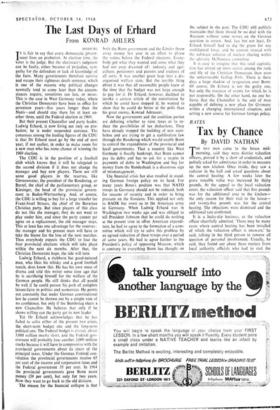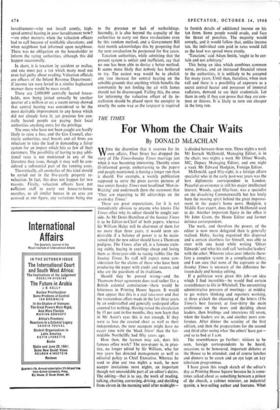Tax by Chance
RATES
By DAVID NATHAN
It is a lucky-dip business, as the valuation officer cheerfully admitted. 'There may be many cases where central heating has been installed of which the valuation officer is unaware,' he said, talking in the third person to remove all question of personal involvement. Usually, he said, they found out about these matters from local authority officials who had to visit the hereditament—why not install comfy, high- speed central heating in your hereditament Now? —on other matters; when the valuation officers had to call because of notifiable alterations; and when neighbour had informed upon neighbour. There was no obligation on the householder to inform the rating authorities, although this did happen occasionally.
In short, it is taxation by accident or malice, and one must pay a tax which many need not even feel guilty about evading. Valuation officials are officers of the Inland Revenue Department: if income tax were levied in a similar haphazard manner there would be mass revolt.
There are 2,600,000 centrally heated house- holds, now being joined annually by another quarter of a million or so; a recent survey showed that central heating was considered to be the most desirable improvement to any house which did not already have it; yet precious few cen- trally heated people are paying their local authorities anything extra for the privilege.
The ones who have not been caught are hardly likely to raise a fuss, and the Gas Council, elec- tricity authorities, coal boards and oil firms are reluctant to take the lead in demanding a fairer system for an impost which hits so few of their customers. The possibility of having to pay addi- tional rates is not mentioned in any of the literature they issue, though it may well be con- sidered a substantial part of the running costs.
Theoretically, all anomalies of this kind should be sorted out in the five-yearly property re- valuation. In fact, this does not happen for two reasons. Firstly, valuation officers have not sufficient staff to carry out house-to-house searches, so all similar houses in an area are assessed at one figure, any variations being due
to the presence or lack of outbuildings. Secondly, it is also beyond the capacity of the authorities to carry out these revaluations even by this random method, and a Government Bill next month acknowledges this by proposing that the next revaluation be postponed for five years.
Taxation authorities, while admitting that the present system is unfair and inefficient, say that no one has been able to devise a better method. It seems more likely that nobody has bothered to try. The easiest way would be to abolish any rate increase for central heating on the sensible grounds that anything which benefits the community by not fouling the air with fumes should not be discouraged. Failing this, the onus for informing the valuation officer of its in- stallation should be placed upon the occupier in exactly the same way as the taxpayer is required to furnish details of additional income on his tax form. Some people would evade, and face the threat of penalties. The majority would comply, and it would follow that, unlike income tax, the individual sum paid in rates would fall as the load was spread more evenly.
`Taxation,' said Adam Smith, 'ought to be cer- tain and not arbitrary.'
This being an idea which combines common sense, justice, and an increased financial return to the authorities, it is unlikely to be accepted for many years. Until then, therefore, when men call and there is a possibility of exposure as a secret central heater and possessor of immoral radiators, demand to see their credentials. Let them in only if they can prove that they are con- men or thieves. It is likely to turn out cheaper in the long run.







































 Previous page
Previous page